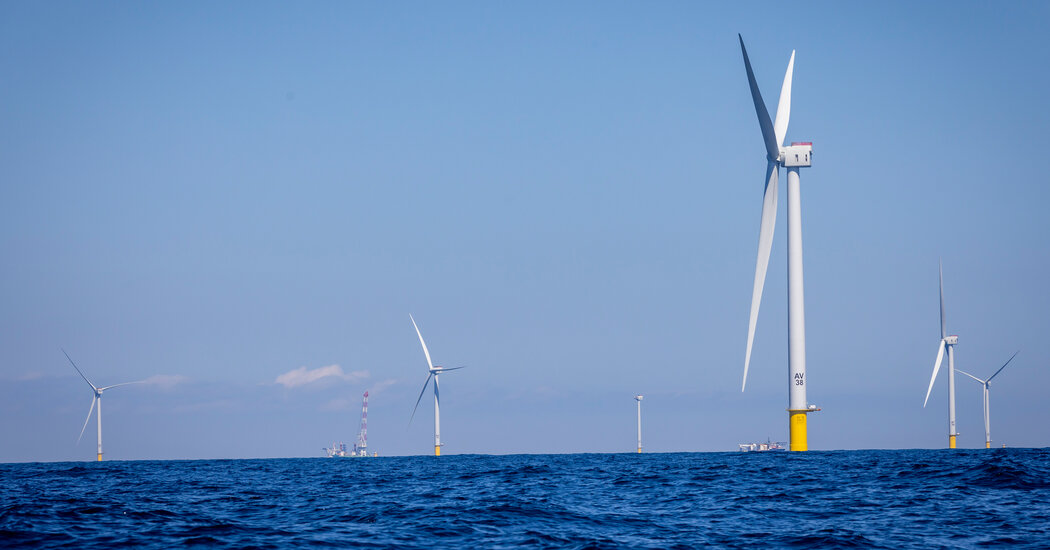Senate Republicans have quietly inserted provisions in President Trump’s domestic policy bill that would not only end federal support for wind and solar energy but would impose an entirely new tax on future projects, a move that industry groups say could devastate the renewable power industry.
The tax provision, tucked inside the 940-page bill that the Senate made public just after midnight on Friday, stunned observers.
“This is how you kill an industry,” said Bob Keefe, executive director of E2, a nonpartisan group of business leaders and investors. “And at a time when electricity prices and demand are soaring.”
The bill would rapidly phase out existing federal tax subsidies for wind and solar power by 2027. Doing so, many companies say, could derail hundreds of projects under development and could jeopardize billions of dollars in manufacturing facilities that had been planned around the country with the subsidies in mind.
Those tax credits were at the heart of the Inflation Reduction Act, which Democrats passed in 2022 in an attempt to nudge the country away from fossil fuels, the burning of which is driving climate change. President Trump, who has mocked climate science, has instead promoted fossil fuels and demanded that Republicans in Congress unwind the law.
But the latest version of the Senate bill would go much further. It would impose a steep penalty on all new wind and solar farms that come online after 2027 — even if they didn’t receive federal subsidies — unless they follow complicated and potentially unworkable requirements to disentangle their supply chains from China. Since China dominates global supply chains, that measure could affect a large number of companies.
“It came as a complete shock,” said Jason Grumet, the chief executive of the American Clean Power Association, which represents renewable energy producers. Soon after the Senate bill was made public, Mr. Grumet said that phones started ringing at 2:30 a.m. on Saturday with “everyone saying, ‘Can you believe this?’”
The new tax “is so carelessly written and haphazardly drafted that the concern is it will create uncertainty and freeze the markets,” Mr. Grumet said.
Even some of those who lobbied to end federal support for clean energy said the Senate bill went too far.
“I strongly recommend fully desubsidizing solar and wind vs. placing a kind of new tax on them,” wrote Alex Epstein, an influential activist who has been urging Republican senators to eliminate renewable energy subsidies. “I just learned about the excise tax and it’s definitely not something I would support.”
The U.S. Chamber of Commerce also criticized the tax. “Overall, the Senate has produced a strong, pro-growth bill,” Neil Bradley, the group’s chief policy officer, posted on social media. “That said, taxing energy production is never good policy, whether oil & gas or, in this case, renewables.” He added: “It should be removed.”
Wind and solar projects are the fastest growing new source of electricity in the United States and account for nearly two-thirds of new electric capacity expected to come online this year. For utilities and tech companies, adding solar, wind and batteries has often been one of the easiest ways to help meet soaring electricity demand. Other technologies like new nuclear reactors can take much longer to build, and there is currently a multiyear backlog for new natural gas turbines.
The repeal of federal subsidies alone could cause wind and solar installations to plummet by as much as 72 percent over the next decade, according to the Rhodium Group, a research firm. The new tax could depress deployment even further by raising costs an additional 10 to 20 percent, the group estimated.
The Senate bill, which is being debated on Sunday, would also eliminate federal tax credits this year for consumers to buy electric vehicles and to install solar panels and heat pumps in their homes. And the bill would impose new restrictions on tax breaks for factories that manufacture wind turbines, solar panels and batteries.
The White House in a statement praised the Senate legislation for “eliminating wasteful environmental policies” and said that “failure to pass the bill would be the ultimate betrayal.” Last week, Mr. Trump wrote that green tax credits are “a giant SCAM” and should be eliminated, referring to wind turbines “and the rest of this ‘JUNK.’”
Some conservatives voiced support for the bill. If “repealing these subsidies will ‘kill’ their industry, then maybe it shouldn’t exist in the first place,” said Thomas Pyle, president of the American Energy Alliance, a conservative research group that supports fossil fuels. “Extending green giveaways on the backs of American taxpayers is shortsighted and neglectful.”
In another unexpected move, Senate Republicans added a provision that would provide tax credits for U.S. production of metallurgical coal, a form of coal that has been used for decades in steel-making and is mainly exported to countries like India and Brazil.
While metallurgical coal accounts for around 10 percent of U.S. coal production and is not used in coal-burning power plants, the contrast struck many observers. Mr. Trump has promised to revive coal, the most polluting of fossil fuels and an industry that has been swiftly declining in the United States.
“The latest Senate draft bill will destroy millions of jobs in America and cause immense strategic harm to our country!” Elon Musk, the billionaire chief executive of Tesla, wrote on Saturday, underscoring his recent split with Mr. Trump. “It gives handouts to industries of the past while severely damaging industries of the future.”
Scientists say that the rollback of clean energy subsidies could exacerbate the risks of global warming, since wind turbines, solar panels and electric vehicles were expected to do much of the heavy lifting in cutting America’s planet-heating greenhouse gas emissions over the next decade.
The fight over energy tax credits has been one of the defining debates in the Republican policy bill. Since the Inflation Reduction Act passed, companies have made plans to invest more than $843 billion across the United States, from sprawling wind farms in Wyoming to battery factories in Ohio. Three-quarters of those planned investments are in Republican-held districts.
The version of the bill passed by the House in May sharply scaled back many of the law’s tax credits. Companies building wind, solar, geothermal or battery-storage plants could get a tax break only if they start construction within 60 days after the bill becomes law and finish the project by the end of 2028. New nuclear plants could receive the credit if they start construction before the end of 2028.
Electric utilities and other companies have warned that abruptly cutting off those tax breaks could cause electricity prices to surge. Many had asked the Senate to phase out the credits more slowly. At the same time, Mr. Trump and other House Republicans urged even deeper cuts.
The latest draft of the Senate bill would preserve tax credits for sources of emissions-free electricity that can run at all hours — such as nuclear reactors, geothermal plants, hydroelectric dams and industrial-scale batteries — through 2036. The bill would also expand tax breaks for biofuels and enlarge subsidies for companies that capture carbon dioxide from smokestacks and use it to extract oil from underground.
But wind and solar power do not fare well. Projects would only qualify for a federal tax credit worth at least 30 percent of project costs if they finish construction by the end of 2027. Developers say that deadline could be difficult to meet even for projects that are already underway, since companies often face delays in obtaining government permits or other obstacles beyond their control.
The bill also creates a complex set of rules requiring developers to prove that they are not using components that can trace back to China or other “prohibited foreign entities.” And, starting in 2027, the bill would impose new excise taxes on companies that fail to meet those requirements, even if they are no longer receiving federal subsidies.
Renewable energy companies say they have been shifting away from Chinese components and toward using domestically made parts, but say that the new restrictions are so opaque that it could be tough for many businesses to prove they are in compliance.
“This puts into complete disarray billions of dollars in investments that we’ve all planned,” said Sandhya Ganapathy, chief executive of EDP Renewables North America, a leading wind and solar developer.
Brad Plumer is a Times reporter who covers technology and policy efforts to address global warming.
The post G.O.P. Bill Adds Surprise Tax That Could Cripple Wind and Solar Power appeared first on New York Times.




